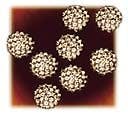The ObservatoryMay 2003 News
New blood test identifies those at risk for coronary events. A new blood test can help physicians predict coronary episodes in patients not previously considered at risk, according to late-breaking data presented at the American College of Cardiologys 52nd Annual Scientific Session in Chicago. Dr. Christie Ballantyne, Director of the Center for Cardiovascular Disease Prevention at Baylor College of Medicine and the Methodist DeBakey Heart Center in Houston, reported that both lipoprotein-associated phospholipase A2 (Lp-PLA2) and high-sensitivity C-Reactive Protein (hs-CRP) are independently associated with the incidence of coronary artery disease. From one-third to one-half of all coronary events occur in patients with low LDL (less than 130) and with no evidence of risk factors, according to the Baylor College of Medicine. Other risk factors include elevated LDL cholesterol, low HDL cholesterol, family history of premature heart disease, high blood pressure, smoking and diabetes. Based on these findings, this study is a valuable step in developing preventive strategies that may utilize blood tests for Lp-PLA2. The PLAC test, a simple blood test that measures Lp-PLA2, may help determine if an individual is at an increased risk for heart disease. FDA approves expanded use of HPV test. The Food and Drug Administration (FDA) recently approved expanded use of a laboratory test to detect the presence in women of human papillomavirus (HPV), one of the most common sexually transmitted infections. There are more than 100 types of HPVs. The test, the HC2 High-Risk HPV DNA Test, manufactured by Digene Corp., of Gaithersburg, MD, can identify 13 of the high-risk types associated with the development of cervical cancer. The HPV DNA test does not test for cancer, but for the HPV viruses that can cause cell changes in the cervix. If left untreated, these changes can eventually lead to cancer in some women.
The FDA initially approved the HPV DNA test in March 2000 for testing women who had abnormal Pap test results to determine whether they needed to be referred for further examination. The new indication allows the test, in conjunction with the Pap test, to be used for screening of women over age 30 for HPV infection. Along with the Pap test, it should be used with a complete medical history and an evaluation of other risk factors to help physicians determine what kind of follow up is necessary. Up to 20 percent of the sexually active U.S. population is believed to be infected with HPV at any one time. Most women who become infected with HPV are able to eradicate the virus and suffer no apparent long-term consequences to their health, but a few women develop a persistent infection that can eventually lead to pre-cancerous changes in the cervix.The HPV DNA test, like the Pap test, is performed by collecting cells from the cervix and then sending them to a laboratory for analysis. The test detects high-risk types of HPV in cell DNA, even before there are any conclusive visible changes to the cervical cells. Women who have normal Pap test results and no HPV infection are at very low risk (0.2 percent for developing cervical cancer). Women who have an abnormal Pap test and a positive HPV test are at higher risk (6 percent to 7 percent or greater) of developing cervical cancer if not treated.The HPV DNA test is not intended to substitute for regular Pap screening, nor is it intended to screen women under 30 who have normal Pap tests. Although the rate of HPV infection in this group is high, most infections are short-lived and not associated with cervical cancer.The FDA approved the expanded use of the test based on published literature describing studies of a cross section of women with normal and abnormal Pap test results who tested positive or negative for high-risk types of HPV. It also took into account additional input from professional societies, FDA advisory panel members and other interested parties in arriving at a decision. JCAHO to shift to unannounced surveys by 2006. The Board of Commissioners of the Joint Commission on Accreditation of Healthcare Organizations (JCAHO) recently announced its intent to begin conducting all regular accreditation surveys on an unannounced basis beginning in January 2006. Unannounced surveys will be pilot-tested in volunteer organizations during 2004 and 2005. The Joint Commission plans to introduce a substantially new accreditation process beginning in January 2004. Plans have been widely discussed with accredited healthcare organizations during the past year. The proposal to transition to unannounced surveys, approved by the Board of Commissioners at its March 28-29 meeting, was a direct outgrowth of those discussions. The Joint Commission evaluates and accredits nearly 17,000 healthcare organizations and programs in the United States, including approximately 9,000 hospitals and home care organizations, and 8,000 other healthcare organizations that provide long-term care, assisted living, behavioral healthcare, laboratory and ambulatory care services.Its
showtime!May 18 May 22, 2003 American Society for Microbiology 103rd General Meeting Washington, DCwww.asmusa.org/mtgsrc/gm2003mtggeneralinfo.htmJune 22- June 24, 2003
Clinical Laboratory Management Association (CLMA)/American Society for Clinical Pathology (ASCP) 2003 Conference & Exhibition
Salt Lake City, Utah
www.clma.org/pubmain.cfm?section=conferenceJuly 7 July 12, 2003 American Medical Technologists (AMT) 65th Educational Program & National Meeting Chicago, ILwww.amt1.comJuly 20 July 24, 2003
American Association for Clinical Chemistry (AACC) Annual Meeting & Clinical Lab Exposition Philadelphia, PAwww.aacc.org/2003am/© 2003 Nelson Publishing, Inc. All rights reserved.
showtime!May 18 May 22, 2003 American Society for Microbiology 103rd General Meeting Washington, DCwww.asmusa.org/mtgsrc/gm2003mtggeneralinfo.htmJune 22- June 24, 2003
Clinical Laboratory Management Association (CLMA)/American Society for Clinical Pathology (ASCP) 2003 Conference & Exhibition
Salt Lake City, Utah
www.clma.org/pubmain.cfm?section=conferenceJuly 7 July 12, 2003 American Medical Technologists (AMT) 65th Educational Program & National Meeting Chicago, ILwww.amt1.comJuly 20 July 24, 2003
American Association for Clinical Chemistry (AACC) Annual Meeting & Clinical Lab Exposition Philadelphia, PAwww.aacc.org/2003am/© 2003 Nelson Publishing, Inc. All rights reserved.
About the Author
Sign up for our eNewsletters
Get the latest news and updates


